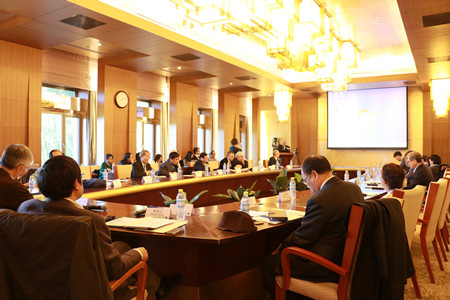Peking University, Nov. 6, 2017: The Beijing Forum 2017 began on November 3, 2017 in Diaoyutai State Guest House under the autumn sky. This year, the topic was “The Harmony of Civilizations and Prosperity for All – Values and Order in a Changing World” with discussion on the challenges and concerns posed by frequent communication between civilizations in the modern world. A slice of the Forum, Panel Session V – “The Spread of Sinitic Civilization in the World” – highlighted the cultural aspect of the international communication.
Yuan Xingpei, Professor of Department of Chinese Language and Literature at Peking University, delivered the keynote speech of this panel session and extended his gratitude to the guests at the beginning of the panel. In his speech, he expressed his hope that Chinese language and literature studies would lead to increased mutual understanding between different civilizations in the future.
Later, Robert L. Chard, a Professor in the Faculty of Oriental Studies at the University of Oxford, gave a speech titled “Patterns in the Global Transmission and Reception of Chinese Culture. ” He explained both the proliferation of Confucius temples in Japan and transmission of Chinese Texts to the West, offering a complete map of the eastward and westward transmission of Chinese Culture.
Cai Zongqi, a Professor at the University of Illinois at Urbana-Champaign, described the future of Sinology in his presentation – “Perspectives Historical of World Wide China Studies in 2050.” He adopted the novel concept of future history and applied it to the assessment of Sinology’s developing tendencies, thus pointing out a new direction for the field of Sinology in the near future.
Then, Sinologist and Professor Colin Patrick Mackerras addressed the conference. His topic was “The Spread of Chinese Civilization across the Great Eurasian Continent: A Big-Picture View of History and the Future,” which was based on rich historical research. It traced the historical spread of Chinese Civilization, which, he proposed, offered a valuable reference for the spread modern Chinese power.
At 15:00, Professor Zhang Bowei, who focused on the study of ancient Chinese poetry and East-Asian poetics, concluded the first half of meeting with his speech: “On the Relationship of Classicism and Literature in the Perspective of East Asia: A Case of Mencius.” His speech zoomed in Mencius’ influence in East Asia, and reflected the different influences that Chinese culture has had on various East-Asian countries.
The five scholars who spoke at the session offered explanations for the spread of Sinitic civilization within multiple contexts such as historical and literary dimensions. After the conclusion of the speeches, the forum entered the discussion portion. Professor Zhao Zhenjiang from Peking University initiated the discussion with an observation concerning the trend of xinshi composition. He expressed his concerns about the inclination of the young generation to rigidly emulate the style of western poetry. Professor Cai Zongqi from Lingnan University echoed this remark, appealing to the Chinese poets to pay more attention to the phonological features of the Chinese language, and to pursue more culturally diverse forms of the poetic art.
Professor Shubhra Tripathi commented on Professor Chard’s talk, seconding his emphasis on the material vectors of cultural transmission. She specially pointed out that Chinese food had played a vital role in the spread of Chinese traditions, with which Professor Mackerras and Professor Song Jae-yoon concurred, the latter offering his view on the influence of food in the Confucian world.
Professor Zhang Bowei and Professor Inahata Koichiro both promoted the discussion of the role of the receiving party of the Sinitic culture. Professor Zhang exemplified the complexity and importance of this issue with the initial reception of the poems of Bai Juyi by the Japanese people, which differed a great deal from how Bai Juyi was evaluated in China. Professor Inahata added that cultural transmission is always a two-way process, and the interaction, rejection and selection of materials and elements are central to interactions among cultures. Professor Rong Xinjiang concluded the discussion with a jovial suggestion that all attendants could take a leisurely moment to appreciate the autumn scenery in the garden.
After the discussion and the teatime break, Professor Leung Yuen-sang from The Chinese University of Hong Kong began the latter half of the panel presentations with a lecture on the beginning of British Sinology and its connections to Hong Kong. He briefly introduced the origins of British Chinese Studies and commented on the pioneering spirit of James Legge and Thomas Wade.
Professor Joseph P. McDermott from University of Cambridge presented his paper on the transmission of paper technology from China to the western world. His retrospective investigation highlighted ancient China’s influence in technological breakthroughs across the globe. Professor Cheng A-tsai focused on the transmission of Chinese primers in an international perspective, expounding, in detail, the reciprocal gradation in cultural interaction.
Professor Wang Xiaoping from Tianjin Normal University delivered the last lecture of the session, exemplifying the early spread of ancient manuscripts with the circulation of Wenguan Cilin. Professor Zhao Zhenjiang chaired the ensuing discussion and delivered the concluding speech.
After the first panel of the discussion ended at 17:00, the scholars attending the panel exchanged their greetings and continued their discussions. The Beijing Forum continued with more presentations and discussions over the next a day and a half, including three additional sessions on the topic of “The Spread of Sinitic Civilization in the World.” The panel provided a platform for world-class sinology scholars to have conversations, and paved the way to further research.
Reported by: Wang Nini, Ma Xiao, Hu Yue
Edited by: Erin Dunne
